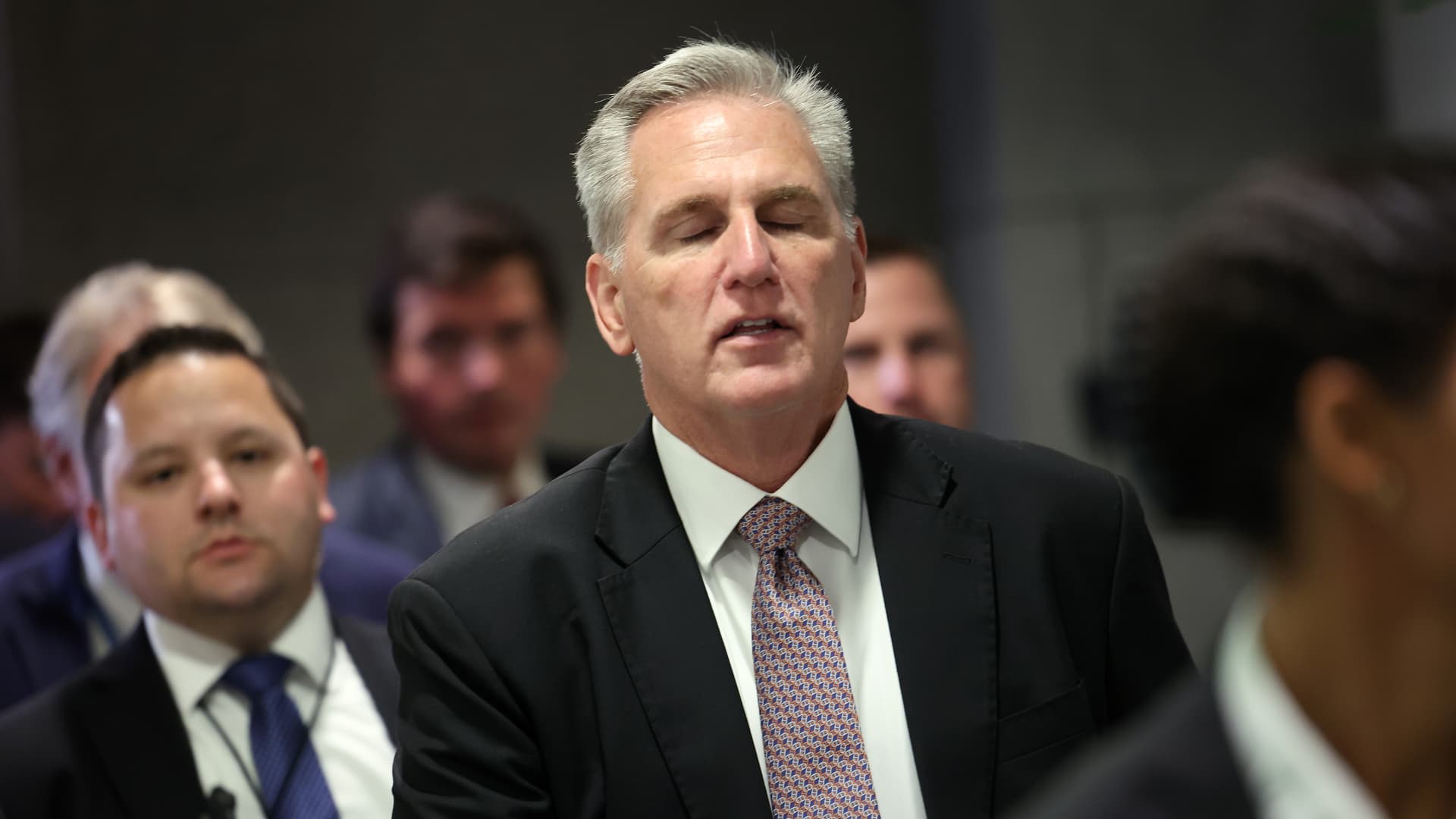Main Topic: Congress likely to pass a short-term government funding bill to avoid a shutdown this fall.
Key Points:
1. Speaker Kevin McCarthy believes a short-term funding bill is necessary due to lack of time for a full-year funding deal.
2. The length of the stopgap bill and policy terms still need to be agreed upon by congressional leaders.
3. The House and Senate are moving in different directions on appropriations, with the House seeking spending cuts and conservative policy provisions, while the Senate aims for bipartisan support and avoids controversial provisions.
House Speaker Kevin McCarthy faces the challenge of avoiding a government shutdown and handling calls for impeaching President Joe Biden from the right-wing of his party, as well as the growing threats to his speakership if he fails to meet the demands of his more conservative members.
Senate Minority Leader Mitch McConnell warns that government shutdowns are a political liability for the Republican Party and supports Speaker McCarthy's efforts to avoid a government shutdown.
President Joe Biden's administration is taking a wait-and-see approach to the potential government shutdown, confident that they can pressure House Speaker Kevin McCarthy to stick to the spending deal they struck in May rather than trying to create a new bipartisan bill.
The White House is preparing for a government shutdown that they believe the public will blame the GOP for, as Speaker Kevin McCarthy struggles to unify his party behind a spending bill, and economists suggest that a shutdown would benefit the Biden administration heading into the 2024 presidential election.
Congress is facing a high probability of a government shutdown as a group of Republican members refuse to cooperate, leading to criticism of House Speaker Kevin McCarthy's inability to control his own caucus and reach a deal with Democrats.
Despite lawmakers' efforts to avert a government shutdown, the country is headed for a shutdown due to the ongoing conflict between conservative hardliners and House Speaker Kevin McCarthy, with some lawmakers resigning themselves to the prospect.
Senate Majority Leader Chuck Schumer is pressuring Speaker Kevin McCarthy to avoid a government shutdown by passing a stopgap funding bill in the Senate and urging McCarthy to bring it to the House for a vote.
The Republican-controlled House of Representatives is attempting to advance spending cuts that are unlikely to become law, potentially leading to a partial government shutdown, as some members of the party threaten to depose House Speaker Kevin McCarthy if he does not support steeper cuts.
Lawmakers are facing a tight deadline to reach an agreement on a budget resolution to avoid a government shutdown as spending laws are set to expire on September 30. House Republicans, led by Speaker Kevin McCarthy, are struggling to unite the GOP caucus and secure enough votes for a deal, while Democratic support would come with political consequences. Failure to reach an agreement would result in paused paychecks for federal employees and disruption of government services.
As a government shutdown looms, lawmakers are scrambling to avoid it despite an earlier agreement between House Speaker Kevin McCarthy and President Biden that was intended to prevent this outcome.
Speaker Kevin McCarthy is advocating for a meeting with President Biden to discuss averting a government shutdown and addressing the situation at the southern border.
Senate leaders are taking control to avoid a government shutdown by advancing a stopgap funding bill, pressuring House Speaker Kevin McCarthy to bring it to the House floor for a vote.
Unless Congress acts soon, the federal government is at risk of shutting down again, leaving millions of federal workers without pay, as House Speaker Kevin McCarthy and his caucus clash over maintaining government operations or implementing drastic spending cuts demanded by conservatives.
The Democratic-controlled Senate plans a procedural vote on a short-term spending measure to avoid a government shutdown, which Republican House Speaker Kevin McCarthy has rejected due to disagreements over spending levels and immigration policies.
House Speaker Kevin McCarthy insists that he will not take up Senate legislation to prevent a government shutdown, as Congress remains divided on funding and time runs out before midnight on Saturday.
Congress remains on track to trigger a government shutdown, as House Speaker Kevin McCarthy faces resistance from hardline conservatives and fails to advance a stopgap bill to extend government funding past a critical deadline.
As Speaker Kevin McCarthy resists scheduling a House vote on a spending bill, President Joe Biden's aides believe that any government shutdown will be blamed on McCarthy and his fellow Republicans rather than the White House, according to officials.
House Republicans are in a funding standoff that may lead to a government shutdown, with House Speaker Kevin McCarthy proposing a stopgap funding bill and facing threats from within his own party.
The ousting of House Speaker Kevin McCarthy raises the odds of a government shutdown in November, which could negatively impact the stock market and further challenge an already struggling economy.
The political dysfunction within the House GOP, including the ouster of former Speaker Kevin McCarthy, is causing concerns for financial markets and adding new risks at a time of heightened fears about inflation, bond yields, and oil markets. The potential for a government shutdown and the delay in electing a new Speaker further compound the worries and could impact consumer confidence and economic data needed by the Federal Reserve to make decisions on interest rates.
Republican senators are concerned about the sudden collapse of Speaker Kevin McCarthy's career in leadership and fear that it will lead to a government shutdown, putting pressure on finding a successor who can avoid such a scenario.
